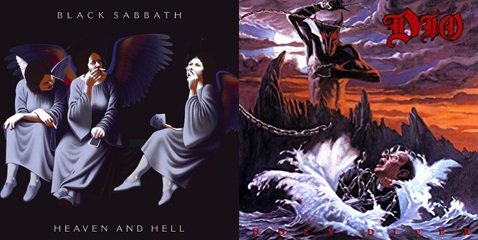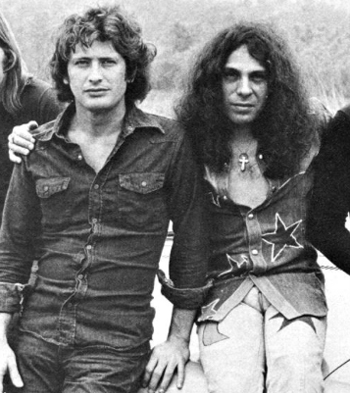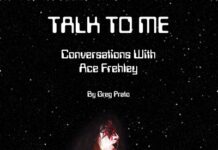Photo Courtesy of Mickey Lee Soule
Before Ronnie James Dio became the undisputed godfather of heavy metal — replete with devil-horn gnarled hands — he was Ronald Padavona, frontman for one of the most underrated bar bands ever pressed onto vinyl. Back in 1972, the diminutive dynamo fronted and played bass for the quartet Elf, a group that with rollicking barrelhouse piano, Pete Townshend-worthy guitar stylings, and Dio’s own straight-from-the-back-of-the-throat vocals, easily sounded more Savoy Brown than satanic.
There’s no denying that Dio is one of the greatest presences ever to have opened his mouth and expel magic into a microphone. Whether setting the visual and personality precedent for vocalists like Klaus Meine (Scorpions); giving Black Sabbath back its balls in the wake of Ozzy Osbourne’s departure; or enthralling us all with tales of rainbows in the dark, Dio’s legacy is forever solidified.
After all, it’s been more than eight years since his untimely passing and I still can’t think of another singer able to match the sheer intensity of an entire philharmonic orchestra and have them playing like it’s life or death. That’s my oh so subtle way of telling you all to listen to Rainbow’s “Stargazer” as quickly as possible.
Yet in talking with Dio’s wife Wendy, you come to quickly learn that the 5-foot-4-inch metal god was also an actual mortal. In the span of 10 minutes, I learned Dio had an affinity for shopping at chain stores (“He liked his sweats and his T-shirts from Walmart.”); hated vegetables (“He was a big meat and potatoes person.”); gave his time to various charities; and loved composing songs while watching sports on television. Raised in Cortland, New York, Dio was a diehard Giants and Yankees fan who counted Baseball Hall of Famers Mike Piazza (even though “he hated the Mets”) and Randy Johnson among his roster of friends.
“He would say, ‘I’m just a man and I was born with a talent,’” Wendy Dio told me. “He just didn’t ever think he was different or better than anyone else. Never, ever thought that.”

A couple months ago, Dio’s estate announced an auction of more than 600 of his personal items. I’m not going to lie – I went through the entire catalog at least three times trying to find something I could justify spending beaucoup bucks on. I gave up after realizing I’d have to explain to my wife Jen why there would be, say, a towering Dio instrument case in our living room or seven crosses of different sizes and materials hanging around my neck (in tandem with my grandfather’s gold chai).
“I thought it was so much better to have (Ronnie’s items) under auction and have people buy and enjoy them,” Wendy said. “He loved his fans and he always shared everything with his fans. I thought this was an opportune time to share it with his fans.”
I personally enjoy Dio in all his many musical permutations. I’ve banged my head to “The Last in Line,” sung “Holy Diver” under my breath in public, and frequently tried to imitate his vocals on the aforementioned “Stargazer” (and wound up with laryngitis each time about 39 seconds in). I still marvel at how an individual who barely comes up to my chest (I’m 6-foot-3) could possess the kind of instrument capable of splitting Stonehenge into pieces.
It all began when I made a beeline for Rainbow’s Rising album back in high school. I’ve been holding on for dear life ever since.
Yet before Ritchie Blackmore ever enters the Dio picture, the latter was a straightforward rock and roller who with Elf began his ascent to musical supremacy. Don’t be fooled by the sinister cover of their debut album (where Dio is depicted more as troll than elf). Groove is what helps the band take shape and nowhere throughout its eight trackers are there references to the occult or Hell. Well “Never More” might be the only exception; a potential sign of things to come.
For Dio, who began his musical leanings at age five practicing the trumpet two hours a day at his father’s request, bass is where he first establishes himself. Yet his prowess on the brass instrument resulted in his having greater lung capacity thanks to the constant breathing exercises he undertook.
“He found he couldn’t pick up girls with the trumpet,” Wendy Dio told me, “So he taught himself bass.”

If you remove Dio — err Padavona — from the Elf equation on this album, you’re left with a sound that could have easily come from the Johnny Rivers “Rockin’ Pneumonia and the Boogie Woogie Flu” sessions of the same year. Frankly, I hadn’t been that surprised by a musical anomaly since I heard Billy Joel’s organ prog work on his lone album with Attila.
Credit this to Dio’s bandmates at the time — guitarist David Feinstein, drummer Gary Driscoll, and pianist/organist Mickey Lee Soule. Elf began with different players and a longer name — the Electric Elves — until a serious automobile accident resulted in personnel changes and the abbreviated Elf name.
“Ronnie called me and asked if I would be interested in joining the band,” Soule, a fellow Cortland native of Dio’s, told me recently. “I said yes immediately.”
“As writing partners, Ronnie and I had spent years playing covers in clubs and colleges around the U.S. and northeast, and we both had played many styles of music then,” he added. “I remember our original intent at the time was to write simple songs with an emphasis on the ‘feel’ of the music, similar to the approach of the Stones [and] Faces.”
The group’s sound is ultimately powerful enough to attract the attention of Deep Purple members Roger Glover and Ian Paice, who produced the band’s eponymous debut. Elf would ultimately open for Purple during several European tours. But remember Dio isn’t “Dio” on Elf’s debut. Wearing a T-shirt and jeans (versus the leather and fringed shirts of future days), Padavona gives it his all on tracks like “I’m Coming Back for You,” “Hoochie Koochie Lady,” and “Love Me Like a Woman.”
“In the beginning, Elf drew more attention overseas due to our relationship with Deep Purple,” Soule said. “Later, we continued to support Deep Purple and others in the states, playing many stadiums along the way. Eventually, our following in the U.S. grew to equal our success overseas.”
Padavona would christen himself “Ronnie James Dio” for Elf’s next two albums — Carolina County Ball (1974) and Trying To Burn the Sun (1975). By 1975, a shift in musical direction (and band) was imminent, courtesy of Purple’s recently-departed guitarist Ritchie Blackmore.

“At first, Ritchie wanted to record a single and asked the band to back him, with Ronnie singing, of course. Ritchie was pleased with the results, and then informed us he would be leaving Deep Purple and asked if we would be interested in forming a band,” Soule told me. “The band would basically be Elf — minus our guitar player — and Ritchie. Although I didn’t want to make the change, I was outvoted, and after recording an album’s worth of songs, the band was named Rainbow … actually Ritchie Blackmore’s Rainbow at first due to record company pressure.”
Track one alone on Ritchie Blackmore’s Rainbow is a standalone masterpiece. It’s the pulsating “Man on the Silver Mountain.” Complemented by the thumping bass of Craig Gruber and Blackmore’s driving guitar melody, Dio builds his vocals up in intensity with every word he sings:
“I’m a wheel, I’m a wheel; I can roll, I can feel, but you can’t stop me turnin’! / ‘Cause I’m the sun, I’m the sun; I can move, I can run, but you’ll never stop me burnin’!”
It’s all uphill from here and the story pretty much explains itself. Dio records two more albums with Rainbow, helping to craft fantasy-laden metal masterpieces like “Catch The Rainbow,” “Tarot Woman” and “Run With The Wolf.” Next comes his frontman position with Sabbath, helping Heaven & Hell go platinum and the band experience a newfound resurgence in popularity throughout the 1980s. By 1983 Dio’s own band is assembled and helps drive metal into the MTV era, complete with swords, wizardry, and a bounty of maloiks to boot.
In his lifetime, Dio considered Holy Diver his greatest contribution to music, according to Wendy Dio, along with his performing with Tony Iommi, Geezer Butler, and drummer Vinny Appice as Heaven & Hell in the years before his death.
“They were the best musicians he ever felt he played with,” Wendy Dio said.
Dio continues to be mourned by loved ones and contemporaries alike. Even though the last time they were in a band together was nearly 45 years ago, Soule adds that his name is right up there with the still-growing list of mourners.
“Ronnie and I were very close personal friends, and my respect for him had little to do with his amazing talents,” he said. “But more than anything, he was my mentor and friend, and I loved him deeply.”

Share your feedback and suggestions for future columns with Ira at vinylconfessions84@gmail.com.




















